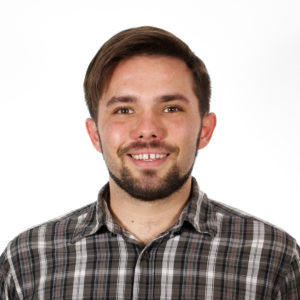I Am Starr King: Interview with Lincoln Statler
 Lincoln Statler
Lincoln Statler
2nd Year MASC Student
What inspired you to become a religious leader?
My religious leadership happened because God wouldn’t give up on me. I just kept getting pulled into positions of leadership. I would be at protests where I would somehow end up in the full circle of organizing. I would be at a church meeting, and no one would step up to do the work so I would volunteer. And it always seemed as though God was pulling me into the direction of religious leadership. Even if it was something that I didn’t necessarily want to do, it was something I was continuously pulled towards. I started to realize that this call encompassed all of the things that I wanted to do. Community organizing, work with the sick and the poor, arts and music—all of this was brought together under the guise of Unitarian Universalist ministry.
Why did you decide to study in the Master of Arts in Social Change program at Starr King?
The Master of Arts in Social Change program is amazing. The Starr King pedagogy is to counter oppression to create just and sustainable communities, and as a Unitarian Universalist that is a huge part of my calling. It is why I am a UU. It is because our faith is compelled to create that beloved community in the world today.
The Master of Arts in Social Change program asks, “What are your passions?” And mine are in Unitarian Universalist lay ministry. And then the program responds, “Here are ways you can apply those passions to the world.”
So in the Master of Arts in Social Change program I am going to be working with the San Francisco street ministry, Faithful Fools. I get to really jump deep into the problems within our society today from a theological lens as a layperson that is called to serve community, without necessarily being called to serve the church. The Master of Arts in Social Change program is perfect for this.
You have served as a protest chaplain in the Black Lives Matter movement. What has called you to do this?
Activism is like prayer. It is something I do without even thinking about it sometimes. It is just a deep, deep part of my identity and my religious experience—the spiritual quest for the liberation of all. I just want to make the world a better place.
I came out of the closet when I was 14 years old in a conservative state. And while I will never know what it is like to be black, because I am a white male, I do have an idea of what it is like to be the other. To the point where it hurts, to where it is defeating, and to where it tears you down instead of builds you up.
I am an activist and I am in the movement because I don’t want anyone to be torn down. I want us to build each other up.
What has been your most memorable or meaningful experience at Starr King?
I think that my most meaningful experience was being accepted to the school. Because I agree with Starr King that sometimes there have to be new ways forward. Religious leadership, spiritual training, sacred activism—there is not one-way to do this; there have to be many ways to do this development. And not just ways that are supported while you are at school, but ways that go farther than that. And Starr King celebrates that and finds every way to ensure that the ministries you are called to are real, cherished, and honored ministries. That it isn’t just an academic ideal. Starr King tries to make your ideal a reality.
So that was the most meaningful part for me—when to my ideal Starr King said, “Yes. Yes!” And hearing that yes is a powerful and transformative thing.
What do you hope to do with your Starr King education going forward?
I have it structured a little bit. I would like to spend the first five years after graduation doing real, on-the-ground work in homeless shelters and youth organizations and being involved in the practical application of the human service industry. And then 10 years from there, I would want to develop into management—learning how to not just work in a shelter, but to coordinate shelters. And then from that point I would want to work at an international level, maybe doing refugee camp coordination for the Red Cross.
And I would do all of this from a spiritual lens and from a Unitarian Universalist lens. It would be a ministry that is meant to take care of the sick and the poor now, without asking for salvation first.
Want to share your story? Send your story to communications@sksm.edu.